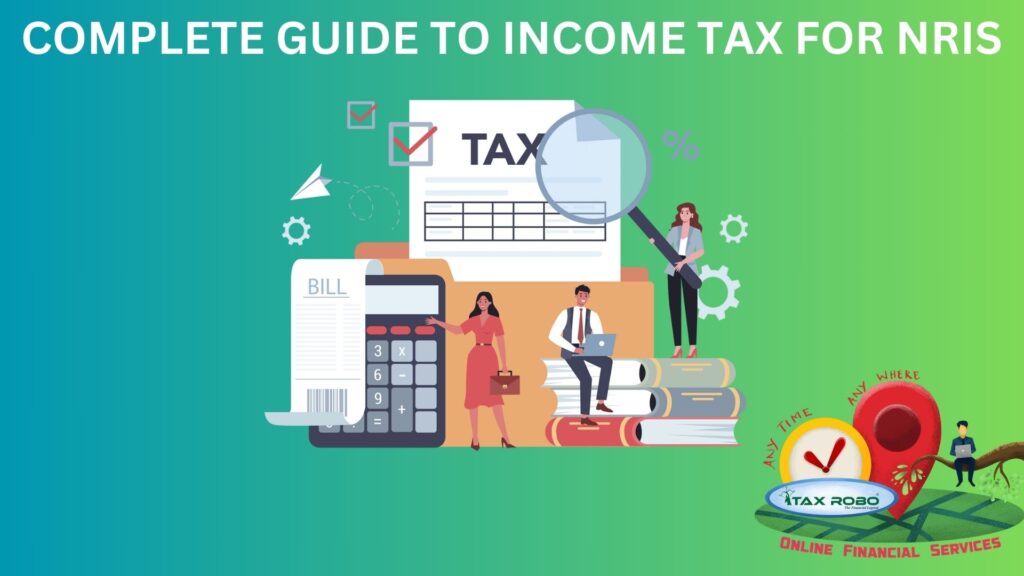Non-Resident Indians (NRIs) often face unique challenges when it comes to understanding and complying with income tax regulations in India. This guide provides a comprehensive overview of the filing requirements, key benefits, and considerations for NRIs.
1. Who Qualifies as an NRI?
Under the Income Tax Act of India, an individual’s residential status is determined based on the number of days they spend in the country. An individual qualifies as an NRI if they meet one of the following criteria:
- They spend less than 182 days in India during the financial year.
- They are outside India for employment or other specified purposes.
2. Income Tax on Income Earned in India
The Income Tax Act imposes tax on the income that an NRI earns in India. This includes:
Income from Salary: Income from salary refers to the money earned by an individual through employment or work performed under a contract of service. It is typically paid by an employer to an employee in exchange for the employee’s time, skills, and efforts. The salary is often calculated on a regular basis, such as weekly, bi-weekly, or monthly, and may vary depending on factors such as job role, experience, location, and company policies.
Here are some key points about income from salary:
1. Salary vs. Wages
- Salary is a fixed, regular payment, typically paid on a monthly or bi-weekly basis. It is often associated with professional, managerial, or administrative roles.
- Wages, on the other hand, are typically paid based on hours worked (e.g., hourly or weekly pay) and may vary depending on the number of hours worked or tasks completed.
2. Components of Salary
A salary may include various components depending on the employer and region, such as:
- Base salary: The fixed amount before bonuses or benefits.
- Bonuses: Additional payments based on performance or company profits.
- Allowances: Benefits such as housing, travel, or meal allowances.
- Overtime pay: Compensation for working extra hours beyond the standard working hours.
3. Taxation on Salary
- Salary income is generally subject to income tax, which is deducted at source by the employer in many countries (known as tax withholding).
- The amount of tax depends on the individual’s income level, tax bracket, and any available deductions or exemptions.
4. Benefits and Deductions
- Some salary packages include additional benefits such as health insurance, retirement savings, stock options, or paid leave.
- Deductions from salary might include tax, social security contributions, pension fund contributions, and health insurance premiums.
5. Salary Calculation
The salary is typically calculated based on the following formula:
- Salary = Base Salary + Bonuses + Allowances – Deductions
For example, if you earn a base salary of $50,000 annually, receive a $5,000 bonus, and have deductions of $10,000 for taxes and other contributions, your effective salary for the year would be $45,000.
Would you like to know more about how salary is taxed, or how to maximize salary benefits?
Income from House Property: Rental income from property located in India is subject to tax in India. NRIs can also claim deductions for expenses such as repairs, maintenance, municipal taxes, and 30% standard deduction on rental income.
1. Rental Income
- Residential Property: Renting out homes, apartments, or other residential units.
- Commercial Property: Leasing office space, retail shops, or industrial spaces.
- Short-term Rentals: Income from platforms like Airbnb, where properties are rented out on a short-term basis.
2. Sale of Property
- When you sell a property for a profit, the gain can be considered income from the property, though in many jurisdictions, it’s categorized as capital gains.
3. Income from Property Management Services
- If you manage properties for others, you can earn income through property management fees, leasing commissions, and other related services.
4. Income from Leaseback Arrangements
- In some cases, a property owner may sell a property but then lease it back, continuing to earn rental income from the same property.
Tax Considerations
- Taxable Income: In many jurisdictions, rental income is taxable. Expenses such as property maintenance, insurance, property taxes, and mortgage interest can often be deducted from your rental income, reducing your taxable income.
- Depreciation: Property owners can also claim depreciation on their property over time, which further reduces their taxable income.
Risks and Considerations
- Vacancy Risks: If tenants move out, the property may remain vacant, leading to a loss of rental income.
- Property Management Costs: Hiring property managers or dealing with maintenance and repairs can reduce the overall profit.
- Market Fluctuations: Real estate markets can be volatile, affecting both rental rates and property values.
Capital Gains:Income from the sale of capital assets (property, stocks, etc.) in India is taxable. NRIs are subject to capital gains tax in India based on the holding period and the nature of the asset (short-term or long-term).A capital gain refers to the increase in the value of a capital asset that is realized when it is sold. In other words, a capital gain occurs when you sell an asset for more than what you paid to purchase it.
Understanding Capital Gains
As noted above, capital gains represent the increase in the value of an asset. These gains are typically realized at the time that the asset is sold, and are often associated with investments, such as stocks and funds, due to their inherent price volatility
Capital gains fall into two categories:
Short-term:Gains realized on assets that you’ve sold after holding them for one year or less
Long-term: Gains realized on assets that you’ve sold after holding them for more than one year
Income from Business/Profession:Business is an activity of purchase and sell of goods with the intention of making profit. Profession is an occupation requiring intellectual skill. E.g. Doctor, Lawyer etc. Vocation is an activity, which requires a special skill, which is used to earn income. e.g. Painter, Singer etc. For income tax purpose there is no difference between business income, profession income and vocation income
Section 2 ( 13 ) :
BUSINESS“ Business includes any trade, commerce or manufacture or anyadventure or concern in the nature of trade, commerce or manufacture.”
Profession : “Profession” may be defined as a vacation, or a job requiring some thought, skill and special knowledge like that of C.A., Lawyer, Doctor, Engineer, Architect etc. So profession refers to those activities where the livelihood is earned by the persons through their intellectual or manual skill.
Other Income:This section consists of interest income, dividend income, agricultural income and all other incomes excluding salary, income from house property or capital gains or business/profession. Interest Income. Tip: Make sure you enter Savings Bank Interest in your tax return.
3. Income Not Taxable for NRIs
While NRIs are subject to tax on their income earned in India, certain types of income may be exempt from tax:
Interest from NRE Accounts: Interest earned on funds held in Non-Resident External (NRE) accounts is exempt from tax in India.
Interest on Foreign Earnings: Interest earned on deposits in foreign countries (like in the US or the UK) is generally not taxable in India.
Dividend Income: Dividends from Indian companies are tax-free in the hands of the NRI up to ₹10 lakh annually. Beyond this threshold, tax is applied.
Capital Gains on Listed Securities (Long-Term): Long-term capital gains from the sale of equity shares or mutual funds (subject to specified conditions) are tax-free up to ₹1 lakh annually. Any capital gains exceeding ₹1 lakh are taxed at 10% without the benefit of indexation.
3. Tax Filing Requirements
NRIs are required to file an income tax return (ITR) in India if:
- Their total income exceeds the basic exemption limit (currently ₹2.5 lakh).
- They have capital gains, regardless of the income threshold.
- They wish to claim a refund of taxes deducted at source (TDS).
4. Tax Benefits Available to NRIs
NRIs can take advantage of several benefits and deductions under Indian tax laws:
- Section 80C: Deductions up to ₹1.5 lakh for specified investments like ELSS, PPF, or life insurance premiums.
- Double Taxation Avoidance Agreement (DTAA): Relief from being taxed twice on the same income in India and their country of residence.
- Special Provisions for NRE and FCNR Accounts: Interest earned on Non-Resident External (NRE) and Foreign Currency Non-Resident (FCNR) accounts is tax-free.
5. Key Documents Required for Filing
To file an ITR in India, NRIs need the following documents:
- PAN card.
- Valid passport as proof of NRI status.
- Details of income earned in India.
- Bank account details (preferably an NRO account for tax purposes).
- Form 16 (for salaried individuals).
6. Common Challenges Faced by NRIs
- Tax Residency Confusion: Misunderstanding residential status can lead to incorrect filings.
- Currency Conversion Issues: Calculating income and investments in Indian Rupees.
- TDS Mismatches: Higher TDS deductions without claiming refunds.
7. Steps to File Taxes as an NRI
- Determine your residential status for the financial year.
- Calculate your total taxable income in India.
- Use the appropriate ITR form (typically ITR-2 or ITR-3 for NRIs).
- File the return online through the Income Tax e-filing portal.
- Verify the return using Aadhaar OTP, net banking, or sending a signed ITR-V form.
8. Penalties for Non-Compliance
Failing to file income tax returns or incorrect filings can result in penalties, including:
- Late filing fees under Section 234F.
- Interest on unpaid tax liabilities under Section 234A, 234B, and 234C.
- Prosecution for willful default in extreme cases.
9. Professional Help for NRIs
Given the complexity of NRI taxation, it is advisable to consult a tax professional or chartered accountant specializing in NRI tax matters. This ensures compliance and maximization of available benefits.
10. Recent Updates and Amendments
Stay updated with the latest changes in tax laws that may impact NRIs, such as:
- Amendments to the definition of residential status.
- Changes in DTAA provisions with specific countries.
- Updates to tax exemptions and deductions.
By understanding these aspects, NRIs can effectively manage their tax obligations and make informed financial decisions. Proper planning and compliance not only avoid penalties but also maximize the benefits available under Indian tax laws.
Income Tax Slabs for NRIs (FY 2024-25)
NRIs follow the same tax slab rates as resident individuals in India:
Annual Income (₹) Tax Rate
Up to 2,50,000 Nil
2,50,001 – 5,00,000 5%
5,00,001 – 10,00,000 20%
Above 10,00,000 30%
Key Notes:
- NRIs are not eligible for the rebate under Section 87A.
- TDS (Tax Deducted at Source) is applied at a higher rate on certain incomes.
Filing Income Tax Returns (ITR) for NRIs
1. When Should NRIs File ITR?
NRIs must file an ITR if:
- Their taxable income in India exceeds ₹2,50,000.
- They want to claim a refund for excess TDS deducted.
- They have capital gains to report.
2. Documents Required
- PAN Card
- Aadhaar (if applicable)
- Details of Indian bank accounts (preferably NRO/NRE accounts)
- Supporting documents for deductions and exemptions claimed
Deductions and Exemptions Available to NRIs
1. Section 80C: Investments
NRIs can claim deductions up to ₹1,50,000 on:
- Life insurance premiums
- ELSS (Equity Linked Saving Schemes)
- Principal repayment of home loans
2. Section 80D: Medical Insurance
Deduction for health insurance premiums:
- ₹25,000 for self and family
- Additional ₹25,000 for senior citizen parents
3. Section 24(b): Interest on Home Loan
Interest deduction of up to ₹2,00,000 for a self-occupied property in India.
4. Other Deductions
Contributions to the National Pension Scheme (NPS) under Section 80CCD.
Charitable donations under Section 80G.
Tax Benefits for NRIs
1. Special Bank Accounts
- NRE Account: Interest earned is tax-free in India.
- FCNR Deposits: Exempt from tax as long as the individual qualifies as an NRI.
2. Double Taxation Avoidance Agreement (DTAA)
India has DTAA treaties with several countries to avoid taxing the same income twice. Key provisions include:
- Reduced TDS rates on certain incomes.
- Tax credit for taxes paid in the foreign country.
Penalties for Non-Compliance
Non-filing or late filing of ITR can attract:
- A penalty of up to ₹10,000 under Section 234F.
Interest under Section 234A for late payment of tax dues.




I’m not sure why but this blog is loading incredibly slow for me. Is anyone else having this problem or is it a problem on my end? I’ll check back later on and see if the problem still exists.
Good web site! I really love how it is simple on my eyes and the data are well written. I am wondering how I could be notified whenever a new post has been made. I have subscribed to your RSS which must do the trick! Have a nice day!
This really answered my problem, thank you!
I have recently started a web site, the info you offer on this website has helped me greatly. Thanks for all of your time & work. “There is a time for many words, and there is also a time for sleep.” by Homer.
I’d always want to be update on new articles on this site, saved to bookmarks! .
When I originally commented I clicked the “Notify me when new comments are added” checkbox and now each time a comment is added I get three emails with the same comment. Is there any way you can remove people from that service? Cheers!
Heya this is kind of of off topic but I was wanting to know if blogs use WYSIWYG editors or if you have to manually code with HTML. I’m starting a blog soon but have no coding knowledge so I wanted to get advice from someone with experience. Any help would be enormously appreciated!
Hey, you used to write fantastic, but the last few posts have been kinda boring?K I miss your tremendous writings. Past several posts are just a little bit out of track! come on!
Hiya, I am really glad I’ve found this info. Nowadays bloggers publish only about gossips and web and this is really annoying. A good blog with exciting content, this is what I need. Thanks for keeping this website, I will be visiting it. Do you do newsletters? Cant find it.